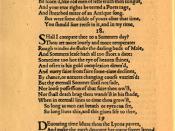Sonnet 18
Shall I compare thee to a summer's day?
Thou art more lovely and more temperate:
Rough winds do shake the darling buds of May,
And summer's lease hath all too short a date:
Sometime too hot the eye of heaven shines,
And often is his gold complexion dimm'd;
And every fair from fair sometime declines,
By chance or nature's changing course untrimm'd;
But thy eternal summer shall not fade
Nor lose possession of that fair thou owest;
Nor shall Death brag thou wander'st in his shade,
When in eternal lines to time thou growest:
So long as men can breathe or eyes can see,
So long lives this, and this gives life to thee.
Summary
The speaker opens the poem with a question addressed to the beloved: "Shall I compare thee to a summer's day?" The next eleven lines are devoted to such a comparison. In line 2, the speaker stipulates what mainly differentiates the young man from the summer's day: he is "more lovely and more temperate."
Summer's days tend toward extremes: they are shaken by "rough winds"; in them, the sun ("the eye of heaven") often shines "too hot," or too dim. And summer is fleeting: its date is too short, and it leads to the withering of autumn, as "every fair from fair sometime declines." The final quatrain of the sonnet tells how the beloved differs from the summer in that respect: his beauty will last forever ("Thy eternal summer shall not fade...") and never die. In the couplet, the speaker explains how the beloved's beauty will accomplish this feat, and not perish because it is preserved in the poem, which will last forever; it will live "as long as men can breathe or eyes can see."


